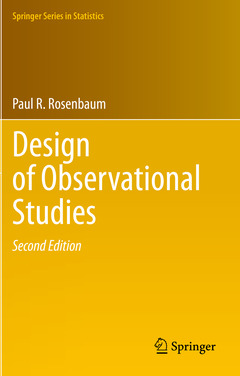Design of Observational Studies (2nd Ed., 2nd ed. 2020) Springer Series in Statistics Series
Auteur : Rosenbaum Paul R.

This second edition of Design of Observational Studies is both an introduction to statistical inference in observational studies and a detailed discussion of the principles that guide the design of observational studies. An observational study is an empiric investigation of effects caused by treatments when randomized experimentation is unethical or infeasible. Observational studies are common in most fields that study the effects of treatments on people, including medicine, economics, epidemiology, education, psychology, political science and sociology. The quality and strength of evidence provided by an observational study is determined largely by its design.
Design of Observational Studies is organized into five parts. Chapters 2, 3, and 5 of Part I cover concisely many of the ideas discussed in Rosenbaum?s Observational Studies (also published by Springer) but in a less technical fashion. Part II discusses the practical aspects of using propensity scores and other tools to create a matched comparison that balances many covariates, and includes an updated chapter on matching in R. In Part III, the concept of design sensitivity is used to appraise the relative ability of competing designs to distinguish treatment effects from biases due to unmeasured covariates. Part IV is new to this edition; it discusses evidence factors and the computerized construction of more than one comparison group. Part V discusses planning the analysis of an observational study, with particular reference to Sir Ronald Fisher?s striking advice for observational studies: "make your theories elaborate."
This new edition features updated exploration of causal influence, with four new chapters, a new R package DOS2 designed as a companion for the book, and discussion of several of the latest matching packages for R. In particular, DOS2 allows readers to reproduce many analyses from Design of Observational Studies.Paul R. Rosenbaum is the Robert G. Putzel Professor of Statistics at the Wharton School of the University of Pennsylvania. He is a fellow of the American Statistical Association. In 2019, he received the R. A. Fisher Award, and in 2003 the George W. Snedecor Award, both from the Committee of Presidents of Statistical Societies (COPSS). He is the author of Observation and Experiment: An Introduction to Causal Inference (2017) and Observational Studies, 2nd edition (Springer 2002).
Introduces the concepts of causal inference in experiments and observational studies using elementary mathematics
Presents many examples and with reference to implementation in R
Discusses design sensitivity in detail for the first time in book form
Features new to this edition include: a new R package DOS2, four new chapters about the analysis of counterclaims (Chapter 7), the choice of statistic for sensitivity analyses (Chapter 19), evidence factors (Chapter 20), and the construction of several comparison groups (Chapter 21)
Date de parution : 07-2021
Ouvrage de 547 p.
15.5x23.5 cm
Date de parution : 07-2020
Ouvrage de 547 p.
15.5x23.5 cm



